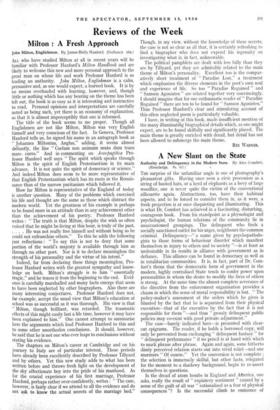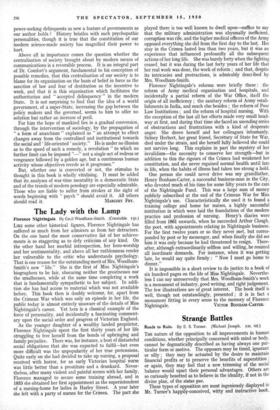A New Slant on the State
Authority and Delinquency in the Modern State. By Alex Comfort.
(Routledge. 8s. 6d.) •
THE surprise of the unfamiliar angle is one of photography's pleasantest gifts. Having once seen a civic procession as a string of booted, hats, or a herd of elephants as a bevy of large woodlice, one is never quite the victim of the conventional silhouette again. Abstractions, too, have their habitual aspects, and to be forced to consider them in, as it were, a fresh projection is at once disquieting and illuminating. This is what Dr. Comfort has achieved in a fascinating, disturbing, courageous book. From his standpoint as a physiologist and psychologist, the human relations of the community lie in unaccustomed groupings. The delinquent who finds a socially sanctioned outlet for his urges, neighbours the common criminal. Delinquency—" a name given by psychopatholo- gists to those forms of behaviour disorder which manifest themselves in injury to others and to society "—is at least as undesirable in its results in alliance with government as in defiance. This alliance can be found in democracy as well as in totalitarian communities. It is, in fact, part of Dr. Com- fort's thesis that the democratic form of government in the modern, highly centralised State tends to confer power upon personalities in whom the desire to modify the lives of others is strong. At the same time the almost complete severance of the directive from the enforcement organisation provides a chasm in which the sense of moral responsibility is lost. "The policy-maker's assessment of the orders which he gives is blunted by the fact that he is separated from their physical execution—that of the executive by the fact that it is not responsible for them "—and thus "grossly delinquent public policies may co-exist with good private adjustment."
The case—barely indicated here—is presented with clear- cut epigrams. The reader, if he holds a borrowed copy, will only be prevented from exchanging " delinquent fantasy" for "delinquent performance" if no pencil is at hand with which to mark phrase after phrase. Again and again, some hitherto dimly perceived relation starts out into vivid relief—and one murmurs "Of course." Yet the conversion is not 'complete ; the selection is immensely skilful, but other facts, relegated for the moment to a shadowy background, begin to re-assert themselves in questions.
Is the dread of atom bombs in England and Ainerica, one asks, really the result of "expiatory sentiment" caused by a sense of the guilt of all war "rationalised as a fear of physical consequences "? Is the successful climb to eminence of power-seeking delinquents as new a feature of governments as our author holds ? History bristles with such psychopathic personalities, though it is true that the constitution of our modern science-made society has magnified their power to hurt.
Above all in importance comes the question whether the central'sqtion of society brought about by modern means of communications is a reversible process. It is an integral part of Dr. Comfort's argument, fundamental to his conception of possible remedies, that this centralisation of our society is to blame for its organisation on the basis of belief in force as the sanction of law and fear of destitution as the incentive to work, and that it is this organisation which facilitates the authoritarian and " accepted delinquency" in the modern State. It is not surprising to find that the idea of a world government, of a super-State, increasing the gap between the policy makers and the governed, seems to him to offer no solution but rather an increase of peril.
For him the hope of mankind lies in a gradual conversion, through the intervention of sociology, by the propagation of "a form of anarchism" explained as "an attempt to effect changes away from the centralised and institutional towards the social and life-oriented 'society." He is under no illusion as to the speed of such a remedy, a revolution "to which no further limit can be imposed "—" not a single act of redress or vengeance followed by a golden age, but a continuous human activity whose objectives recede as it progresses."
But, whether one is Converted or not, the stimulus to thought in this book is wholly. vitalising. It must be added that its analyses of war-time mentality in a democratic State and of the trends of modern penology are especially admirable. Those who are liable to suffer from strokes at the sight of words beginning with " psych " should avoid it. All others























 Previous page
Previous page